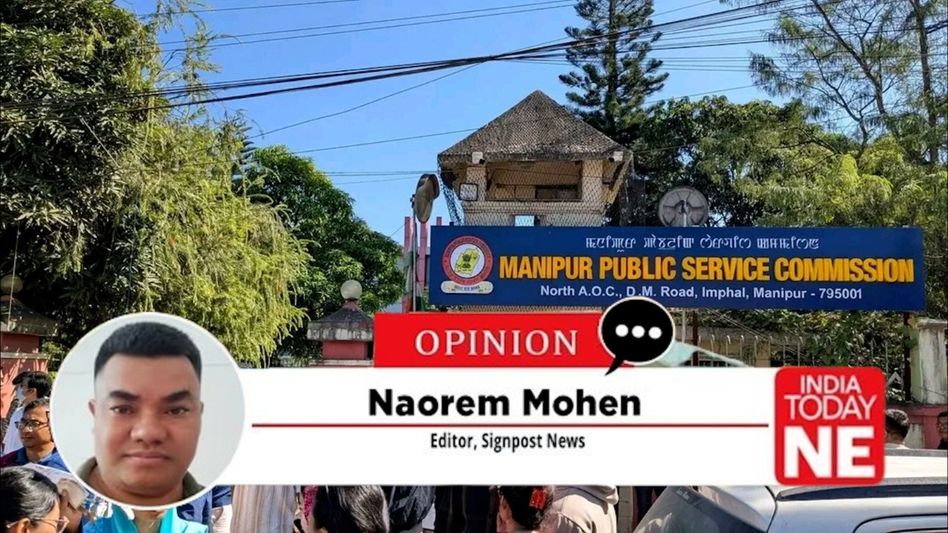Toward a Scandal-Free Manipur Civil Services Examination 2022
The Manipur Civil Services Combined Competitive Examination 2022, originally notified for 100 posts, has followed an unusually protracted timeline that merits contextual understanding. The preliminary examination was successfully conducted before May 2023, with approximately 1300 candidates qualifying for the mains.

The Manipur Civil Services Combined Competitive Examination 2022, originally notified for 100 posts, has followed an unusually protracted timeline that merits contextual understanding. The preliminary examination was successfully conducted before May 2023, with approximately 1300 candidates qualifying for the mains.
However, the Manipur violence that erupted in Manipur shortly thereafter suspended all administrative processes. It was only in 2024 that the mains examination could be resumed. In a commendable display of inclusivity, the Manipur Public Service Commission made special arrangements to conduct the examination at two centres: Imphal for the majority of candidates and Guwahati for approximately 199 Kuki and Thadou candidates who were unable to travel to the state capital due to security concerns.
These logistical efforts highlight the Commission’s commitment to ensuring equitable access amid extraordinary circumstances.Yet, on 9 November 2025, this long-delayed examination encountered a significant administrative irregularity. Candidates at both Imphal and Guwahati centres received General Studies Paper-IV instead of the scheduled Paper-III during the morning session.
The discrepancy was identified within minutes of commencement, necessitating the immediate cancellation of both papers. The MPSC promptly rescheduled the examinations for 22 November 2025 and issued a clarification attributing the mismatch to an error at the secured printing press, while exposing its policy of maintaining absolute confidentiality by prohibiting officials from inspecting question papers prior to their opening in the examination hall.
This incident, though swiftly addressed through cancellation and rescheduling, exposes structural vulnerabilities in the examination conduct framework. A dispassionate examination of the episode reveals that the lapse was not an isolated aberration but the consequence of an overly rigid interpretation of confidentiality that inadvertently compromised essential verification mechanisms.
The Manipur Public Service Commission’s clarification, while transparent in acknowledging the printing error, simultaneously highlights a procedural philosophy that prioritises secrecy to the extent of forgoing practicable quality controls.
Confidentiality remains a cornerstone of high-stakes competitive examinations, rightly designed to prevent leaks and preserve meritocracy. However, the MPSC’s assertion that “no official is allowed to see the Question Papers” and that papers are opened “only in front of the candidates” establishes an absolute prohibition that eliminates intermediate checks.
Empirical evidence from the Union Public Service Commission and several state commissions demonstrates that confidentiality and pre-distribution verification are not mutually exclusive. Coded identification, sealed master-copy inspection by designated officers, packet-weight reconciliation, and electronic tagging have been successfully employed without compromising secrecy.
The present case illustrates the peril of an uncompromising stance: a mismatch between heading and content evaded detection until the moment of distribution. Such differential impact exposed the necessity of centre-wise manifest reconciliation prior to dispatch.
The incident raises legitimate concerns regarding the credibility and preparedness of the examination authority. When a process designed to select the state’s future administrators falters at the threshold of execution—particularly after a two-year delay occasioned by civil unrest—public confidence in the institution is inevitably eroded.
The MCS Mains is not merely an academic exercise; it is a gateway to governance. Any irregularity, however promptly rectified, carries systemic ramifications that extend beyond the immediate cohort of examinees.
The Commission’s decision to issue a “due warning” to the printing press and to express regret for the inconvenience is a necessary first step. Yet institutional resilience demands more than remedial admonition; it requires proactive redesign of protocols to preclude recurrence.
To strengthen the examination process and rebuild trust, the MPSC should promptly isolate afternoon papers in separate logged vaults, retain public opening while adding pre-opening barcode, weight, and sealed master-copy checks by two sworn officers, publish a brief technical report on the lapse and corrective steps, mandate regular training, certification, and mock drills for all staff, create an independent annual audit committee of retired officials, academics, and judges, and reimburse candidates’ travel costs while providing a modest hardship allowance.
These targeted reforms will balance confidentiality with reliability and prevent recurrence.The rescheduled papers on 22 November 2025 must now proceed with unflinching smoothness, culminating in the timely declaration of results untainted by further controversy.
Let this long-delayed 2022 examination finally break the cycle of disruptions that has shadowed the MPSC in recent years. May it deliver a selection process that is transparent, incorruptible, and truly merit-based—identifying the finest talents to serve Manipur and restoring faith in one of the state’s most vital institutions.
Copyright©2025 Living Media India Limited. For reprint rights: Syndications Today








